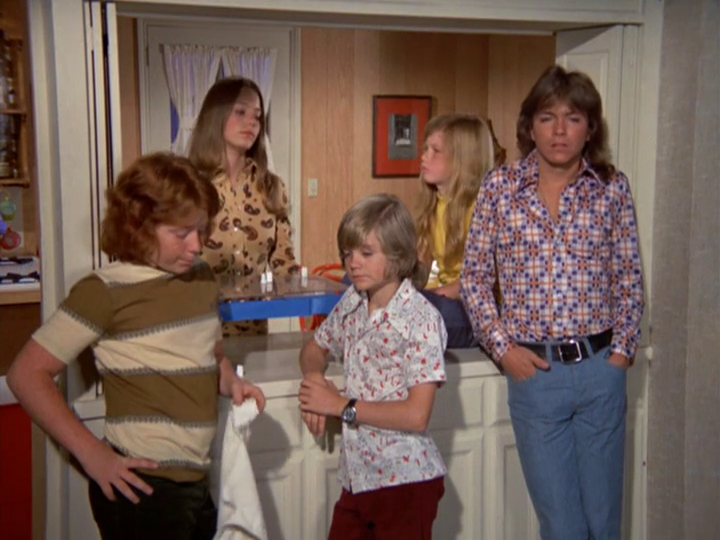
A road diary set to a warm backbeat—loneliness, gratitude, and the price of motion.
First, the anchors that keep memory honest. “One Night Stand” opens Sound Magazine (August 1971), the third LP by The Partridge Family. It’s written by Wes Farrell and Paul Anka, runs about 3:06, and—like the rest of the album—was cut at United Western in Hollywood with the same elite L.A. studio corps often nicknamed the Wrecking Crew. Session notes place the take on May 5, 1971; the personnel list reads like a who’s-who: Hal Blaine (drums), Larry Knechtel/Mike Melvoin (keys), Dennis Budimir/Louie Shelton (guitars), Max Bennett (bass), and the Ron Hicklin Singers cushioning David Cassidy’s lead. It wasn’t issued as a U.S. A-side, but it later served as the B-side to “It’s One of Those Nights (Yes Love)” (Dec. 1971), and in some territories even flipped to the A-side under the title “Función de una Noche.”
Now listen to the scene the record paints. A bus window at dusk. The dull shine of a guitar case. A singer counting miles instead of hours and telling himself the truth: every night—a different town—I sing my song; pack my things and move along. The lyric keeps its head down and speaks in plain details—train cars, motel rooms, candy bars—because that’s how life on the road actually feels: specific, repetitive, oddly tender in the quiet. Cassidy leans into that intimacy. He doesn’t belt; he rounds his vowels and lets the band breathe around him, so the feeling lands like a thought you meant to keep to yourself. (You can see the language on the page in chord sheets and fansites; it’s deliberately un-fancy, which is its strength.)
The arrangement is all proportion and kindness. Blaine’s drums walk rather than stomp; the guitars answer Cassidy’s lines without crowding; piano glints like passing streetlights. Farrell’s production (with Melvoin’s string/horn sensibility across the album) keeps everything legible, radio-clear, but never slick enough to make the singer feel insulated from the life he’s describing. That’s the Sound Magazine signature: sunlight in the mix, room for air, the performance scaled for kitchens and car radios as much as for the TV show. No surprise the album is often singled out—by fans and critics alike—as the Partridges’ most complete pop statement.
If you met “One Night Stand” first on television, you probably remember the face that goes with it. The series finally placed the song—fittingly—in Season 3’s “Diary of a Mad Millionaire” (aired March 16, 1973), where the group performs it whole, the camera letting Cassidy sell the lyric’s push-and-pull between motion and longing. It took a while for the track to reach the screen—Sound Magazine had been out since ’71—but the later placement suited the song’s more adult center of gravity.
What the song means, underneath the itinerary, is something older listeners recognize immediately: ambivalence that isn’t self-pity. The title flirts with a bedroom boast, but the verses reveal a different truth—the “one night stand” is the show itself, the handshake with a town you’ll leave before you learn its back roads. The chorus doesn’t complain; it takes stock. Success is real, and so is the cost. And because Farrell and Anka write without ornament, the insight sneaks up on you: the life you wanted sometimes asks you to live without the things you need.
That’s why Cassidy’s delivery matters so much. He was famously photogenic, but on record his instinct is restraint—he lets the story carry the emotion. You can hear him shade just a little more breath into the line where the pace accelerates, then relax again when the band tucks in behind him. It’s not “confessional” in the 1970s sense; it’s observational, a pro at work telling you what the work feels like when the lights go down and the miles start up.
There’s also a quiet grace in how the track sits on the A-side of the LP. Opening an album with a road song that admits to a little ache is a choice. It frames everything that follows—“Echo Valley 2-6809,” “I Woke Up in Love This Morning,” and the radiant “Summer Days”—with the knowledge that joy and restlessness live in the same suitcase. It’s pop craft with grown-up weather: a bright melody that doesn’t lie about the shadows. (For the ledger-keepers: Sound Magazine hit No. 9 on the U.S. album chart, Top 20 in the U.K.; the track list prints “One Night Stand” right at the top.)
One more thread worth tugging: authorship. Pairing Paul Anka—a writer with a lifetime’s feel for the itinerant life—with Wes Farrell, the Partridge architect, yields a lyric that understands the professional side of romance: how applause can be as fleeting as affection, and how both can still feel holy in the moment. If the show’s “family band” conceit sometimes painted with sugary colors, this cut draws in pencil—sure hand, light touch, nothing overstated.
Decades on, “One Night Stand” still warms a room without raising its voice. Part of it is the playing—those unfussy drums, those chiming guitars—but the larger part is its posture. It neither glamorizes nor scolds the life it describes. It simply keeps moving, grateful and a little lonesome, promising to do the job well and catch its breath where it can. On a night when you’re measuring your own distances—between what you wanted and what you chose—the record feels like company. Put it on, and you may recognize the soft lesson the Partridges tucked into that opening groove: love the town you’re in, sing the song you’ve got, and try not to forget the names before you go.